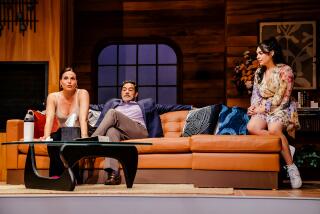TV review: ‘The Song of Lunch’ is a poetic pleasure
- Share via
“The Song of Lunch,” which airs Sunday as part of PBS’ “Masterpiece Contemporary” series, is something you don’t see every day, not even in bardic old England, whence it comes, and where a 47-minute TV drama using a narrative poem for a screenplay would seem somewhat more likely than it would here.
Christopher Reid is the poet whose 2009 book is the source of all the words spoken here, in order, nearly all of them by the wonderful Alan Rickman, and nearly all the rest of them by the equally wonderful Emma Thompson, two actors whose many other accomplishments may be obscured in far posterity by their having appeared in “Harry Potter” movies. Of course, this can be said of nearly every major actor in the U.K. today. There is nothing to be done about it.
The characters are nameless. (I’ll use the actors’ first names to denote the people in the play, and their last to name the people playing them.) We follow Alan from his office in Bloomsbury — he is an unfulfilled editor of books “at a publishing house of ill repute” and a very minor poet — to a restaurant in Soho where he has arranged a date with Emma, an old flame. Although the characters are (chronologically) mature, a fact I’m old enough myself to find refreshing, this is also a kind of cautionary tale for the socially networked world, in which a mouse-click can raise our figurative dead.
Alan and Emma have not seen each other in 15 years. She left him for another, more successful writer, and lives in Paris as “the good wife and loving mother.” She is present in the moment, where he is stuck in their mutual past. Potterites will detect notes of Snape in his bitterness.
This is a film about poor communication in which somebody is speaking nearly the entire time — Rickman, mostly, both as the narrator, who also speaks for Alan, and as Alan speaking (less eloquently than the voice in his head) to Emma. That the narration runs in the third person also creates the impression that Alan is looking at himself from the outside, trapped in his own thoughts — “out to lunch at your own lunch,” Emma observes — which become more clouded by alcohol as time goes on. The camera obligingly (and prettily) wanders according to his own wandering attention.
There is no big-wet-kiss resolution, only a funny little last jog of the sort that short stories offer. And Rickman’s character can be frustrating — you want to knock some sense into him, at least to knock the rudeness out. But the reason to watch is for the sensual pleasure, and the plain fun, of artful language artfully spoken. This is a place where an offered menu “slices into the infant conversation like a sweetly swung ax” and a bottle says to a glass, “A word in your ear” before it “blurts out its sorrows in a splashy gabble.”
More to Read
The complete guide to home viewing
Get Screen Gab for everything about the TV shows and streaming movies everyone’s talking about.
You may occasionally receive promotional content from the Los Angeles Times.







